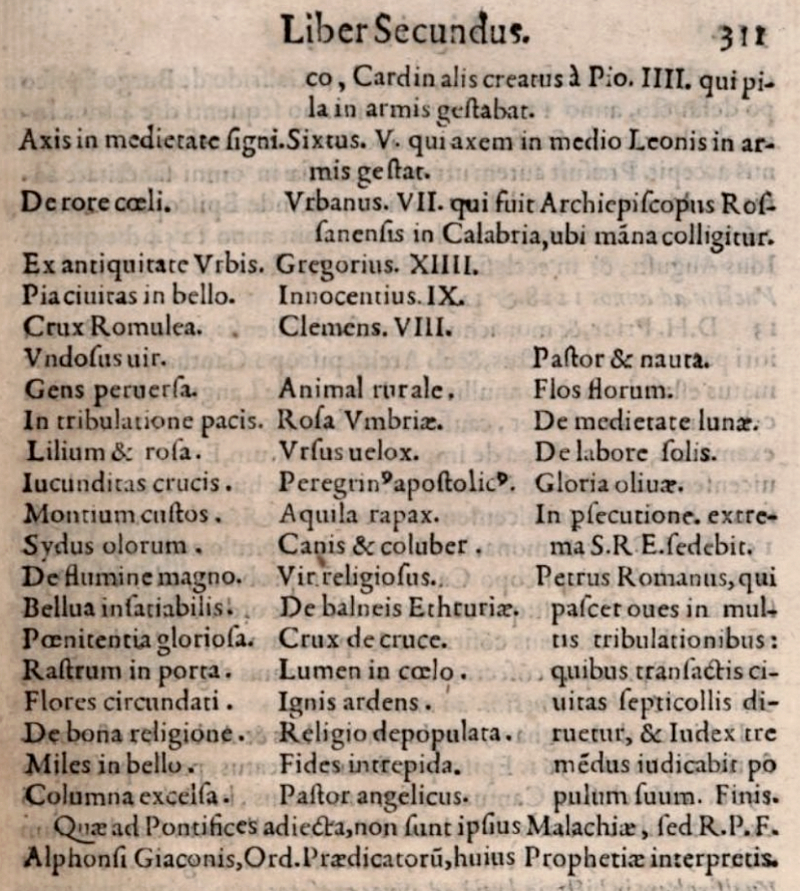|
Postdiction
Postdiction involves explanation after the fact. In skepticism, it is considered an effect of hindsight bias that explains claimed predictions of significant events such as plane crashes and natural disasters. In religious contexts, theologians frequently refer to postdiction using the Latin term ''vaticinium ex eventu'' (foretelling after the event). Through this term, skeptics postulate that many biblical prophecies (and similar prophecies in other religions) appearing to have come true may have been written after the events supposedly predicted, or that the text or interpretation may have been modified after the event to fit the facts as they occurred. Skeptics of premonition use these terms in response to claims made by psychics, astrologers and other paranormalists to have predicted an event, when the original prediction was vague, catch-all, or otherwise non-obvious. Most predictions from such figures as Nostradamus and James Van Praagh express the future with such seemi ... [...More Info...] [...Related Items...] OR: [Wikipedia] [Google] [Baidu] |
Nostradamus
Michel de Nostredame (December 1503 – July 1566), usually Latinised as Nostradamus, was a French astrologer, apothecary, physician, and reputed seer, who is best known for his book ''Les Prophéties'' (published in 1555), a collection of 942 poetic quatrains allegedly predicting future events. Nostradamus's father's family had originally been Jewish, but had converted to Catholic Christianity a generation before Nostradamus was born. He studied at the University of Avignon, but was forced to leave after just over a year when the university closed due to an outbreak of the plague. He worked as an apothecary for several years before entering the University of Montpellier, hoping to earn a doctorate, but was almost immediately expelled after his work as an apothecary (a manual trade forbidden by university statutes) was discovered. He first married in 1531, but his wife and two children died in 1534 during another plague outbreak. He fought alongside doctors against the p ... [...More Info...] [...Related Items...] OR: [Wikipedia] [Google] [Baidu] |
Vaticinium Ex Eventu
''vāticinium ex ēventū'' (, "prophecy from the event") or ''post eventum'' ("after the event") is a technical theological or historiographical term referring to a prophecy written after the author already had information about the events being "foretold". The text is written so as to appear that the prophecy had taken place before the event, when in fact it was written after the events supposedly predicted. ''Vaticinium ex eventu'' is a form of hindsight bias. The concept is similar to postdiction. Examples In religious writings The Babylonian "Marduk Prophecy", a text describing the travels of the Marduk idol from Babylon, "prophesies" of the statue’s seizure during the sack of the city by Mursilis I in 1531 BC, Assyria, when Tukulti-Ninurta I overthrew Kashtiliash IV in 1225 BC and took the idol to Assur, and Elam, when Kudur-Nahhunte ransacked the city and pilfered the statue around 1160 BC. A copy was found in the House of the Exorcist at Assur, whose contents date fr ... [...More Info...] [...Related Items...] OR: [Wikipedia] [Google] [Baidu] |
Postdictable
Postdictable concepts are those concepts that can be justified after having been seen.Upal, M. A. An Alternative View of the Minimal Counterintuitiveness Effect, Journal of Cognitive Systems Research, 11(2), 194-203. Upal labeled a counterintuitive concept as postdictable if the postdiction process is successful making sense of the concept i.e., the reader is successfully able to construct a justification given the reader's background knowledge, level of motivation and interest, and the cognitive resources (including time) available to the reader. According to the context-based model of minimal counterintuiveness, postdictable counterintuitive concepts are minimally counterintuitive and are remembered well. Those counterintuitive concepts that are not postdictable in a given context are considered to be maximally counterintuitive and are not remembered well by people. Thus the concept of a flying elephant is postdictable (and thus minimally counterintuitive) when set up in the con ... [...More Info...] [...Related Items...] OR: [Wikipedia] [Google] [Baidu] |
Prophesy
In religion, a prophecy is a message that has been communicated to a person (typically called a ''prophet'') by a supernatural entity. Prophecies are a feature of many cultures and belief systems and usually contain divine will or law, or preternatural knowledge, for example of future events. They can be revealed to the prophet in various ways depending on the religion and the story, such as visions, divination, or direct interaction with divine beings in physical form. Stories of prophetic deeds sometimes receive considerable attention and some have been known to survive for centuries through oral tradition or as religious texts. Etymology The English noun "prophecy", in the sense of "function of a prophet" appeared from about 1225, from Old French ''profecie'' (12th century), and from ''prophetia'', Greek ''propheteia'' "gift of interpreting the will of God", from Greek ''prophetes'' (see prophet). The related meaning, "thing spoken or written by a prophet", dates from 130 ... [...More Info...] [...Related Items...] OR: [Wikipedia] [Google] [Baidu] |
Prophecy Of The Popes
The Prophecy of the Popes ( la, Prophetia Sancti Malachiae Archiepiscopi, de Summis Pontificibus, "Prophecy of Saint-Archbishop Malachy, concerning the Supreme Pontiffs") is a series of 112 short, cryptic phrases in Latin which purport to predict the Catholic popes (along with a few antipopes), beginning with Celestine II. It was first published in 1595 by Benedictine monk Arnold Wion, who attributed the prophecy to Saint Malachy, a 12th-century archbishop of Armagh. Given the accurate description of popes up to around 1590 and lack of accuracy for the popes that follow, historians generally conclude that the alleged prophecy is a pseudepigraphic fabrication written shortly before publication. The Catholic Church has no official stance, though some Catholic theologians have dismissed it as forgery. The prophecy concludes with a pope identified as "Peter the Roman", whose pontificate will allegedly precede the destruction of the city of Rome. History Publication and content T ... [...More Info...] [...Related Items...] OR: [Wikipedia] [Google] [Baidu] |
Moving The Goalposts
Moving the goalposts (or shifting the goalposts) is a metaphor, derived from goal-based sports, that means to change the rule or criterion (goal) of a process or competition while it is still in progress, in such a way that the new goal offers one side an advantage or disadvantage. In sports Deliberately moving the goalposts constitutes a professional foul in rugby football and an unfair act in gridiron football. The officials are granted ''carte blanche'' to assess whatever penalty they see fit, including awarding the score for any attempt at a goal missed or invalidating any goal scored as a result of the moved goalposts. In both rugby and gridiron, goalposts are anchored into the ground; the distance they can be moved (most easily in gridiron by pulling down on one end of the crossbar to tilt both posts either to the left or the right) is far more restricted. Inadvertently moving the goalposts in a touchdown celebration is an unsportsmanlike conduct penalty of 15 yards against ... [...More Info...] [...Related Items...] OR: [Wikipedia] [Google] [Baidu] |
Ronald Reagan
Ronald Wilson Reagan ( ; February 6, 1911June 5, 2004) was an American politician, actor, and union leader who served as the 40th president of the United States from 1981 to 1989. He also served as the 33rd governor of California from 1967 to 1975, after having a career in entertainment. Reagan was born in Tampico, Illinois. He graduated from Eureka College in 1932 and began to work as a sports announcer in Iowa. In 1937, Reagan moved to California, where he found Ronald Reagan filmography, work as a film actor. From 1947 to 1952, Reagan served as the president of the Screen Actors Guild, working to Hollywood blacklist, root out alleged communist influence within it. In the 1950s, he moved to a career in television and became a spokesman for General Electric. From 1959 to 1960, he again served as the guild's president. In 1964, his speech "A Time for Choosing" earned him national attention as a new conservative figure. Building a network of supporters, Reagan was 1966 Califo ... [...More Info...] [...Related Items...] OR: [Wikipedia] [Google] [Baidu] |
John Hinckley, Jr
John Warnock Hinckley Jr. (born May 29, 1955) is an American man who attempted to assassinate U.S. President Ronald Reagan in Washington, D.C. on March 30, 1981, two months after Reagan's first inauguration. Using a .22 caliber revolver, Hinckley wounded Reagan, police officer Thomas Delahanty, and Secret Service agent Tim McCarthy. He critically wounded White House Press Secretary James Brady, who was left permanently disabled in the shooting. Hinckley was reportedly seeking fame to impress actress Jodie Foster, with whom he had an obsessive fixation. He was found not guilty by reason of insanity and remained under institutional psychiatric care for over three decades. Public outcry over the verdict led to the Insanity Defense Reform Act of 1984, which altered the rules for consideration of mental illness of defendants in Federal Criminal Court proceedings in the U.S. In 2016, a federal judge ruled that Hinckley could be released from psychiatric care as he was no longer c ... [...More Info...] [...Related Items...] OR: [Wikipedia] [Google] [Baidu] |
Allegory
As a literary device or artistic form, an allegory is a narrative or visual representation in which a character, place, or event can be interpreted to represent a hidden meaning with moral or political significance. Authors have used allegory throughout history in all forms of art to illustrate or convey complex ideas and concepts in ways that are comprehensible or striking to its viewers, readers, or listeners. Writers and speakers typically use allegories to convey (semi-)hidden or complex meanings through symbolic figures, actions, imagery, or events, which together create the moral, spiritual, or political meaning the author wishes to convey. Many allegories use personification of abstract concepts. Etymology First attested in English in 1382, the word ''allegory'' comes from Latin ''allegoria'', the latinisation of the Greek ἀλληγορία (''allegoría''), "veiled language, figurative", which in turn comes from both ἄλλος (''allos''), "another, different" ... [...More Info...] [...Related Items...] OR: [Wikipedia] [Google] [Baidu] |
Skepticism
Skepticism, also spelled scepticism, is a questioning attitude or doubt toward knowledge claims that are seen as mere belief or dogma. For example, if a person is skeptical about claims made by their government about an ongoing war then the person doubts that these claims are accurate. In such cases, skeptics normally recommend not disbelief but suspension of belief, i.e. maintaining a neutral attitude that neither affirms nor denies the claim. This attitude is often motivated by the impression that the available evidence is insufficient to support the claim. Formally, skepticism is a topic of interest in philosophy, particularly epistemology. More informally, skepticism as an expression of questioning or doubt can be applied to any topic, such as politics, religion, or pseudoscience. It is often applied within restricted domains, such as morality ( moral skepticism), atheism (skepticism about the existence of God), or the supernatural. Some theorists distinguish "good" or moder ... [...More Info...] [...Related Items...] OR: [Wikipedia] [Google] [Baidu] |
September 11, 2001 Attacks
The September 11 attacks, commonly known as 9/11, were four coordinated suicide terrorist attacks carried out by al-Qaeda against the United States on Tuesday, September 11, 2001. That morning, nineteen terrorists hijacked four commercial airliners scheduled to travel from the Northeastern United States to California. The hijackers crashed the first two planes into the Twin Towers of the World Trade Center in New York City, and the third plane into the Pentagon (the headquarters of the United States military) in Arlington County, Virginia. The fourth plane was intended to hit a federal government building in Washington, D.C., but crashed in a field following a passenger revolt. The attacks killed nearly 3,000 people and instigated the war on terror. The first impact was that of American Airlines Flight 11. It was crashed into the North Tower of the World Trade Center complex in Lower Manhattan at 8:46 a.m. Seventeen minutes later, at 9:03, the World Trade Center’s So ... [...More Info...] [...Related Items...] OR: [Wikipedia] [Google] [Baidu] |



.jpg)



